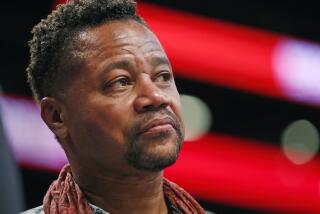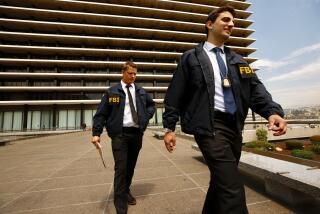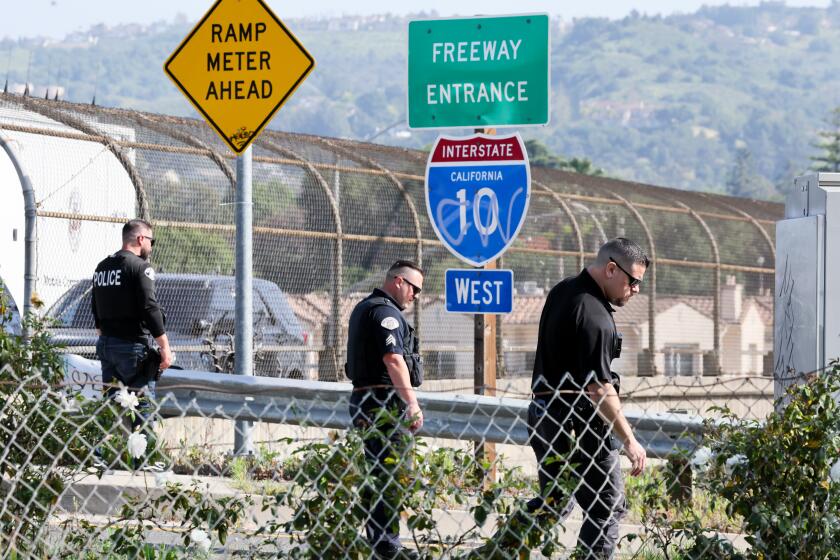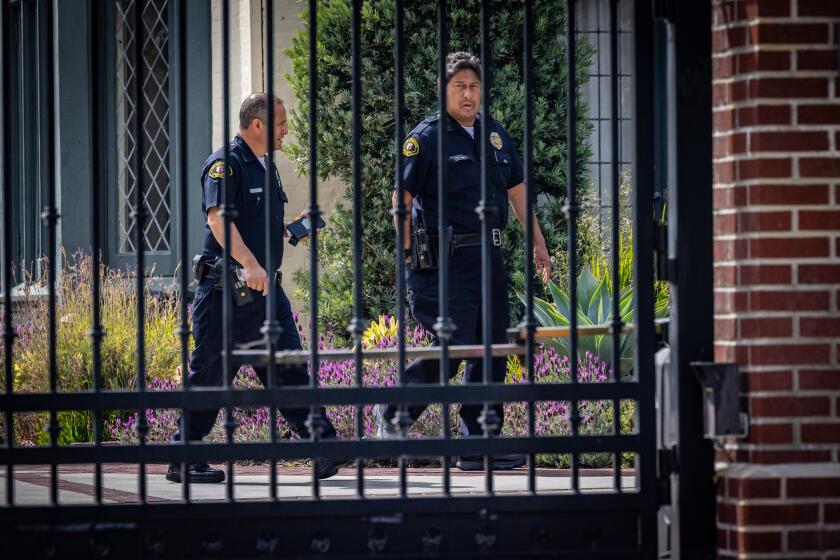Figure in B.I.G. Case Tells of Offer
A former Los Angeles police officer says that lawyers who are suing the city over the killing of rap star Notorious B.I.G., and who have accused him of arranging the murder, offered him financial inducements to help them win their case.
David A. Mack, who has long denied any role in the 1997 murder, said in an interview that the lawyers urged him to invoke the 5th Amendment in court and refuse to answer questions about the killing so he would appear guilty.
In return, Mack said, the lawyers told him he would not have to pay any damages awarded by the jury because they would seek payment only from the city.
Mack said they also offered to help him bring his own suit against the city later for failing to provide him adequate legal representation in the case. He said they suggested that he could win millions of dollars.
The wrongful-death suit by the family of Notorious B.I.G., born Christopher Wallace, is being tried in U.S. District Court in L.A. To win damages from the city, the plaintiffs must persuade the jury that Mack, a police officer at the time, was “liable” for the killing. No one has ever been charged with the crime.
Mack, now in prison for an unrelated bank robbery, said he rejected the alleged proposal from the family’s lawyers. In March, Mack’s lawyer, Marc S. Harris, informed the U.S. attorney’s office about the reputed offer.
Harris told prosecutors that he would be willing to cooperate with them in investigating the lawyers’ conduct, a law enforcement official said. The U.S. attorney’s office did not pursue the matter. The plaintiffs later dropped Mack as a defendant, and he has not testified.
The Wallace family’s lawyers, Perry R. Sanders and Robert J. Frank, said Mack’s allegations were groundless. In e-mails to The Times, they said that they had never made an offer of the kind Mack described and that “anything to the contrary is a lie.”
“There has been one serious settlement discussion with defendant Mack and [it] contained no conditions resembling what you ask about,” Sanders said.
Asked whether the lawyers urged Mack to invoke the 5th Amendment, Sanders said: “Mr. Mack has taken the 5th extensively previously, and it was anticipated that if he testified live he would do the same.”
Mack has never invoked the 5th Amendment regarding the Wallace slaying and has offered to take a polygraph test to prove his innocence. He has taken the 5th in response to questions about the bank robbery.
Asked whether he offered to represent Mack in a lawsuit against the city, Sanders said that “things were discussed with Mr. Mack’s attorney which are subject to confidentiality provisions” and referred the question to Harris.
Harris declined to comment on discussions he had had with authorities, his client or the plaintiffs’ lawyers — other than to say that he had discussed all settlement proposals with Mack.
Mack, interviewed at a federal correctional facility in Santa Ana, said: “I find it ironic that the same law firm that prosecuted me for the murder of Ms. [Voletta] Wallace’s son would suddenly switch sides and offer to represent me in an action against the city.
“I’m innocent,” he said. “I had nothing to do with the murder of Christopher Wallace, and they know it.”
Notorious B.I.G., also known as Biggie Smalls, was gunned down March 9, 1997, after a music industry party at the Petersen Automotive Museum in the Mid-Wilshire district. Wallace, 24, was waiting in a car at a stoplight when a man pulled up in a dark Chevrolet Impala, opened fire and sped off.
Mack came under suspicion later that year when he was charged with robbing a Bank of America branch in South Los Angeles. He was convicted of the robbery and sentenced to 14 years in prison.
Detectives investigating the Wallace killing learned that Mack owned a black Impala. A witness, shown a photo of Mack, said he thought he had seen him outside the Petersen Museum on the night of the shooting.
Detectives suspected that Mack might have conspired with rap mogul Marion “Suge” Knight to arrange the ambush. Knight had been engaged in a bitter feud with Wallace and other East Coast rap figures, and he was rumored to have close ties to corrupt police officers.
Investigators soon abandoned the theory, but it was kept alive by a stream of books, TV specials and documentaries featuring Mack and Knight as figures of suspicion. Mack, 44, has nursed deep bitterness over the publicity.
Three years ago, Wallace’s mother; his widow, entertainer Faith Evans; and other family members sued the city, Mack and other defendants.
The suit alleged that Mack was affiliated with the Mob Piru Bloods, a South Los Angeles gang; that he worked as a “covert agent” for Knight’s rap label, Death Row Records; and that he conspired to murder Wallace.
The suit seeks damages from the city on the grounds that Mack used his authority as a police officer to orchestrate the killing, and that the Los Angeles Police Department knew or should have known that he was in league with Knight.
Mack, in his interview with The Times, said the plaintiffs’ lawyers first approached him in February 2004, when Frank visited him at a federal prison in Alabama.
Mack, who was not then represented by a lawyer, said Frank sought to assure him that he need not suffer financial consequences if the lawsuit was successful.
According to Mack, Frank suggested that if he helped the plaintiffs prevail in court, they would not try to collect damages from him. Instead, any monetary judgment hanging over Mack could be “assigned” to the city, according to Mack’s account of the conversation.
Mack described the meeting in a sworn deposition in May 2004. In the same deposition, he denied the central allegations in the lawsuit: He said he had nothing to do with Wallace’s murder, did not belong to any gang and had never worked for or met Knight.
In March of this year, as the lawsuit headed to trial, the city hired Harris, a former federal prosecutor, to represent Mack.
By then, Mack’s role in the case had assumed new importance. U.S. District Judge Florence-Marie Cooper had split the case into three parts — one involving Mack, the second involving the city and the last to determine damages.
She ruled that the plaintiffs could pursue their claims against the city and reach the damages phase only if they first persuaded the jury that Mack was liable for Wallace’s death.
Before, Mack had been one of numerous defendants. Now, the entire case — and any hope of securing a financial judgment — turned on proving the allegations against him.
Over the next three months, Frank and Sanders had a series of discussions with Harris. Mack said his lawyer informed him of the conversations in detail.
According to Mack, the talks centered on the possibility that the plaintiffs would drop him as a defendant. In return, he said, they sought his help in winning the first phase of the trial — the part centering on the allegations against him.
In a March 10, 2005, conference call, Frank and Sanders suggested that it would be in Mack’s interest to invoke the 5th Amendment, Mack said.
On March 17, Sanders, Frank, Harris and other lawyers in the case were in New York to conduct a pretrial deposition. After finishing the deposition, Sanders and Frank asked Don W. Vincent, a lawyer for the city attorney’s office, to leave the room so they could meet privately with Harris. During a 40-minute discussion, Sanders and Frank again proposed that Mack take the 5th, Mack said. The jury would not hear him assert his innocence; rather, he would invoke his right against self-incrimination.
By Mack’s account, the lawyers told Harris that if Mack denied the allegations against him in court, they would confront him aggressively and try to paint him as a perjurer. They hinted that they had evidence linking him to Knight and the gang world, Mack said.
Harris told the lawyers he would confer with Mack and get back to them. Harris did some research, Mack said, and told him that he believed the proposal violated federal and state laws, which forbid witnesses to accept anything of value in relation to their testimony.
Sanders called Harris back three weeks later, renewing his offer, Mack said. Sanders raised the issue again in a phone call April 20, during a meeting several weeks later, in a phone conversation in late May and again this month, according to Mack.
In these discussions, Mack said, Sanders renewed the threat to portray him as a perjurer if he did not take the 5th.
According to Mack, Sanders also suggested that once the trial was over, Mack could file his own claim against the city for failing to give him proper legal representation early in the case. Mack said that Sanders offered to represent him in such a suit, adding that Mack stood to collect millions of dollars in damages.
Finally, Harris told Sanders that he and Mack were not interested and that they considered the offer improper, according to Mack. Sanders and Frank protested that they had not intended to propose anything unethical or illegal, Mack said.
The plaintiffs’ lawyers agreed this month to drop him as a defendant.
Asked why, Sanders said the plaintiffs wanted “to keep the suit focused on the civil rights claims against the LAPD.”
The agreement leaves Mack free to testify in the case. The only condition is that he agree not to sue the Wallace family for malicious prosecution.
Mack said he was infuriated by the lawyers’ suggestion that he keep silent in the face of allegations that he knew to be false and that he had already denied under oath.
“I find it insulting that the same lawyers who demonized me as a murderer would have the gall to approach me with such an offer,” Mack said. “This thing is a mockery of justice. It’s not about catching the killer. It’s about hitting the jackpot.”
More to Read
Start your day right
Sign up for Essential California for news, features and recommendations from the L.A. Times and beyond in your inbox six days a week.
You may occasionally receive promotional content from the Los Angeles Times.






